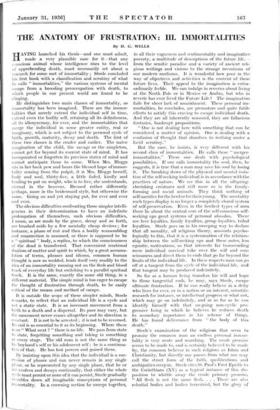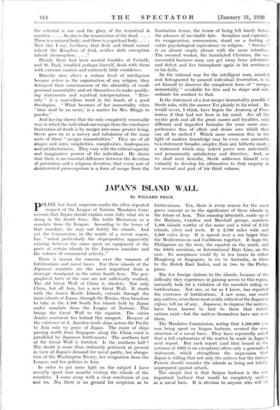THE ANATOMY OF FRUSTRATION: III. 13IMORTALITIES
By H. C. WELLS HAVING launched his thesis—and one must admit, made a very plausible case for it—that any conscious animal whose intelligence rises to the level of apprehending death, must necessarily set about a research for some sort of immortality ; Steele concluded his first book with. a classification and scrutiny of what he calls " immortalities," the various systems of mental escape from a brooding preoccupation with death, to which people in our present world are found to be clinging.
He distinguishes two main classes of immortality, as immortality has been imagined. There are the immor- talities that merely extend the individual self in time, extend even the bodily self, retaining all its definiteness, all its idiosyncrasy, for ever, and the immortalities that merge the individual in some greater entity, real or imaginary, which is not subject to the personal cycle of birth, growth, maturity, decay and death. The first of these two classes is the cruder and earlier. The naive imagination of the child, the savage or the simpleton, cannot get far beyond its current state of mind. It has incorporated or forgotten its previous states of mind and cannot anticipate those to come. When Mrs. Bloggs sits in her. back pew and hears the Messed hope of immor- tality coming from the pulpit, it is Mrs. Bloggs herself, body and soul, thirty-five, a little faded, kindly and tending to put on weight, who is to live, she understands, eternal in the heavens. Dressed rather differently perhaps, more in the bridesmaid style, but otherwise the same.• Going on and yet staying put, for ever and ever and ever.
The obvious difficulties confronting those simpler intern- gencies in their determination to have an indefinite prolongation of themselves, such obvious difficulties, I mean, as are made by the grave, decay and so forth, are brushed aside by a few mentally cheap devices ; for instance, a phase of rest and then a bodily reassembling and resurrection is assumed, or there is supposed to be a " spiritual " body, a replica, to, which the consciousness of the dead is transferred. That convenient irrational dualism of matter and spirit to which, by a great accumu- lation of terms, phrases and idioms, common human thought is now so wedded, lends itself very readily to the idea of animmortality running not.on the flesh and blood track of everyday life but switching to a parallel spiritual track. It is the same, exactly the same old thing, in a different material. The simple mind is too eager to escape the thought of frustration through death, to be easily critical of the means and method of escape.
It is outside the scope of these simpler minds, Steele remarks, to reflect that an individual life is a -cycle and lint a static state. It is an incessant movement from a birth to a death and a dispersal. Its pace may vary, but the movement never ceases altogether and its direction is constant. It is not to be arrested ; it is not to be reversed. Its end is as essential to it as its beginning. Where there is no " What next ? " there is no life. We pass from state to state, forgetting something and taking in something at every stage. The old man is not the same thing as his boyhood's self or his adolescent self ; he is a continua- tion of that. He has lost powers and gained them.
By insisting upon this idea that the individual is a suc- cession of phases and can never remain in any single Phase, or be represented by any single phase, that he or she evolves and decays continually, that either the whole cycle must persist or none of it can persist, Steele gradually crumbles- down all imaginable conceptions of personal ilimiortality. In a crowning section he sweeps together, in all their vagueness and sentimentality and imaginative poverty, a multitude of descriptions of the future life,— from the semitic paradise and a variety of ancient reli- gious writings and visions to the strange inventions of our modern mediums. It is wonderful how poor in the way of objectives and activities is the content of these future lives. Their appeal to the imagination is extra- ordinarily feeble. We can indulge in reveries about living at the North Pole or in Mexico or Arabia, but who in reverie has ever lived the Future Life ? The imagination fails for sheer lack of nourishment. These personal im- mortalities, he concludes, are premature and quite futile efforts to satisfy this craving to escape individual death. And they are all inherently unsound, they are fallacious fantasies, bankrupt propositions.
" One is not dealing here with something that can be considered a matter of opinion. One is dealing with a confusion of thought that dissolves to nothing under a lucid scrutiny."
But the case, he insists, is very different with his second class of immortalities. He calls these " merger- immortalities." There one deals with psychological possibilities. If one calls immortality the soul, then, lie suggests, it is true that a man may save his soul by losing it. The breaking down of the physical and mental isola- tion of the self-seeking individual is in accordance with the practices of nature. We see this in all the offspring- cherishing creatures and still more so in the family- forming and social animals. They think nothing of self-sacrifice for the herd or for their young. The mentality such types display is no longer a completely closed system of self-preservation. Even in the lowliest types of men there lie about the central core of the self-conscious self- seeking ego great systems of personal abandon. There are love loyalties, family loyalties, group loyalties, tribal loyalties. Steele goes on in his sweeping way to declare that all morality, all religious theory, amounts psycho- logically to this, that it is a systemisation of the relation- ship between the self-seeking ego and these outer, less egoistic, motivations, so that interests far transcending mere individual survival take over the will and con- sciousness and direct them to ends that go far beyond the limits of the individual life. In these respects man can go off at a tangent from the cycle of the individual life, and that tangent may be produced indefinitely.
So far as a human being transfers his will and hope to those tangential ends, he may, says Steele, escape ultimate frustration. If he can really believe in a deity who lives for ever, or in a nation or an interest, scientific research for instance, or intellectual progress or what not, which may go on indefinitely, and in so far as he can identify himself with that' on-going non-cyclic pro- gressive being in which he believes he reduces death to secondary importance in his scheme of things. He ha:s found deliverance from " the body of this death."
Steele's examination of the religions that seem to promise the common man an endless personal immor- tality is very acute and searching. The crude promise seems to be made to, and is certainly believed to be made by, the common believer in such religions as Islam and Christianity, but directly one passes from what one may call the street form of the faith, qualifications and ambiguities creep in. Steele cites St. Paul's First Epistle to the Corinthians (XV) as a typical instance of this dis- position to whittle away the crude primary promise. " All flesh is not the same flesh. . . . There are also celestial bodies and bodies terrestrial, but the glory of the celestial is one and the glory of the terrestrial is another. . . . So also is the resurrection of the dead. . . . There is a natural body, and there is a spiritual body. . . . Now this I say, brethren, that flesh and blood cannot inherit the Kingdom of God, neither cloth corruption inherit incorruption. . . ."
Plainly there had been mental troubles at Corinth, and St. Paul, troubled perhaps himself, deals with them with extreme caution and extremely little confidence.
Directly men above a certain level of intelligence became active in the organisation of any religion, they betrayed their consciousness of the absurdity of crude • personal immortality and set themselves to make qualify- ing statements and mystical interpretations. " Eter- nity " is a marvellous word in the hands of a good theologian. " What becomes of her immortality when ' time shall be no more,' is a matter for Mrs. Bloggs to ponder."
And having shown that the only completely reasonable way in which the individual can escape from the conclusive frustration of death is by merger into some greater being, Steele goes on to a survey and tabulation of the main sorts of these " merger immortalities." They are of all shapes and sizes, simplicities, complexities, inadequacies and satisfactoriness. They vary with the critical capacity and imaginative powers of the individual. He shows that there is no essential difference between the devotion of patriotism and a religious devotion, that every sort of disinterested preoccupation is a form of escape from the frustration terror, the terror of being left lonely before the advance of inevitable fate. Socialism and especially its exaggeration, communism, stand on a footing of entire psychological equivalence to religion. " Service " is an almost empty phrase with the same intention. The sweated worker, the humiliated Christian, the un- successful business man, can get away from inferiority and defeat and live triumphant again in his sentiment or his faith.
So the rational way for the intelligent man, assailed and beleaguered by assured individual frustration, is to set himself to discover the completest form of " merger immortality " available for him and to shape and sub- ordinate his conduct to that.
Is the statement of a best merger-immortality possible ? Steele asks, with the answer Yes plainly in his mind. He would never, I think, have begun the Anatomy of Frus- tration if that had not been in his mind. Are all the mystic gods and all the great causes and loyalties, only different and imperfect formulae for some more com- prehensive flux of effort and desire into which they can all be melted ? Which same common flux in the light of modern knowledge may be even now amenable to a statement broader, simpler, than any hitherto made ; a statement which may indeed prove now universally and permanently satisfactory and directive. And, as we shall next describe, Steele addresses himself very valiantly to develop his affirmative to that enquiry in his second and part of his third volume.











































 Previous page
Previous page